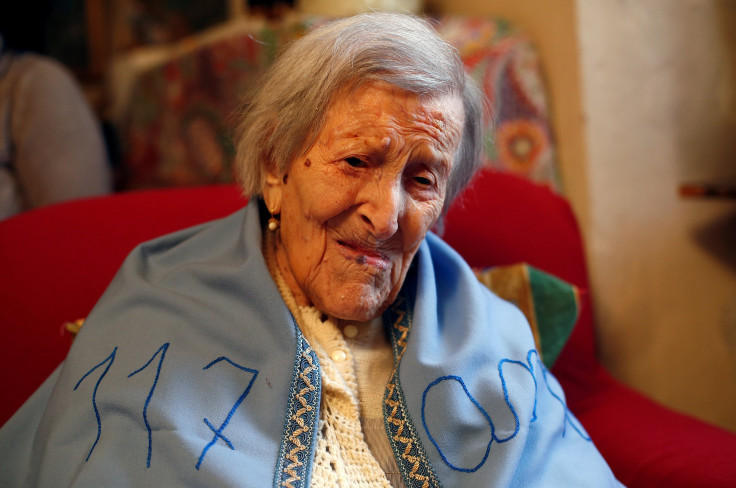How Genes Play A Role In Aging Process: The Secret To Living Longer

Emma Morano, 117, who was declared the world’s oldest living person by the Guinness World Records, died last month in Verbania, Italy.
While the right diet cannot be ruled out as one of her secrets to longer life, experts say genetics might have played an important role too.
Doctors pointed out that super-centenarians like Morano have within them many “aging well” genes, and that out of the 30,000 genes or so in the human genome, people who live above 100 years of age, have the right variations in at least 130.
“We all on this planet have an average genetic makeup or blueprint that should get us to about our late 80s...If you smoke, drink, weigh too much, don’t exercise, you’re going to die a lot sooner,” said Dr. Thomas Perls, professor of medicine and geriatrics at Boston University and Boston Medical Center, told Today.
Read: World's Oldest Person, Emma Morano, Dies At 117
Morano was not the only one in her family to live a long life. One of her sisters died just short of 100, and another lived to 102, according to the New York Times. Longevity tends to run in families. Evidence can be seen of a genetic connection in families between siblings who live into their 90s, like in Morano’s case, or families that have generations of centenarians, according to National Institute on Aging.
One such example would be the small Sardinian mountain town of Ovoddain in the Italian region, boasts of being the only region in the world where as many men as women live to be 100 years of age, the BBC reported.
"People in this town have lived in relative isolation from the rest of the world for hundreds of years. They marry into each other’s families," Luca Deiana, professor of clinical biochemistry at Sassari University, Italy, told the BBC.
In fact most people living in the town today are descended from a very small number a original settlers. "Marriage among relatives is not the rule but there are some cases of this taking place," said Professor Deiana. "From a genetic point of view when this happens there's a higher probability of having genetic diseases, but also of having positive results like centenarians."
Mothers’ genes also play a vital part in determining how fast their children grow old by passing on genetic mutations that speed up the aging process, according to a 2013 study. Scientists at Sweden's Karolinska Institute and the Max Planck Institute for Biology of Aging in Germany reported for the first time how inherited DNA from mothers also affects the aging process.
"Surprisingly, we also show that our mother's mitochondrial DNA (mDNA) seems to influence our own aging," said Nils-Göran Larsson, professor at the Karolinska Institute and principal investigator at the Max Planck Institute for Biology of Aging . "If we inherit mDNA with mutations from our mother, we age more quickly."
Mitochondria are "structures within cells that convert the energy from food into a form that cells can use." These mitochondria also have a small amount of their own DNA, which is referred to as mDNA and these are inherited from the mother, according to U.S. National Library Of Medicine.
"Normal and damaged DNA is passed down between generations; however, if the mother’s DNA has mutations, it is possible that her child will age faster," said Larsson.
The scientists also said their findings can highlight more on the aging process and prove mitochondria play a key role in aging. Their study also suggests it’s important to reduce the number of mutations.
© Copyright IBTimes 2024. All rights reserved.






















